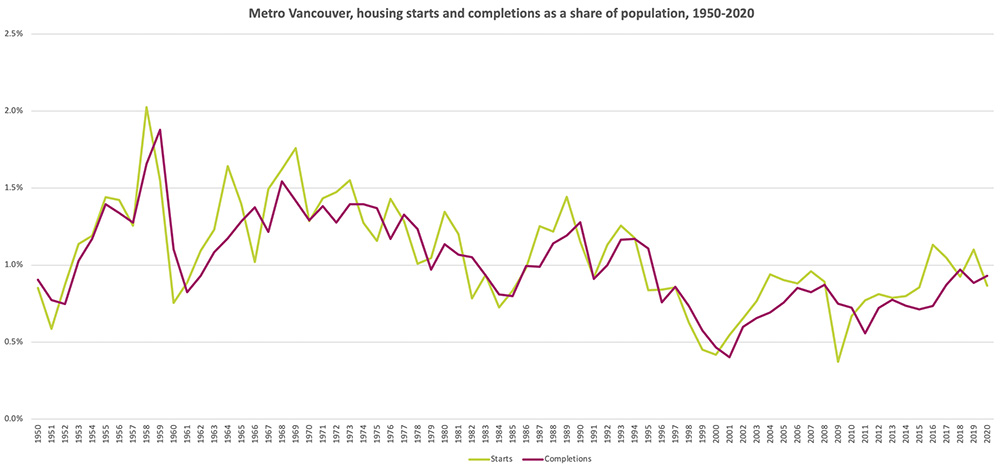[Editor’s note: This is reprinted with permission from Policy Note, a blog of the B.C. office of the Canadian Centre for Policy Alternatives, a progressive think tank based in Vancouver.]
The final report of the Canada-British Columbia Expert Panel on the Future of Housing Supply and Affordability, published in June 2021, contains 23 recommendations made primarily to the B.C. and federal governments. The panel organized these under five broad calls to action:
- Creating a planning framework that proactively encourages housing;
- Reforming fees on property development;
- Expanding the supply of community and affordable housing;
- Improving co-ordination among and within all orders of government; and
- Ensuring more equitable treatment of renters and homeowners.
Just hours after the report’s release finance minister (and former housing minister) Selina Robinson rejected one of the report’s recommendations to eliminate the Home Owner Grant and to instead direct those funds to support social housing. Currently the Home Owner Grant is a tax expenditure that costs the government $887 million per year. So it is not at all clear whether the panel report will get a serious hearing in Victoria, particularly in areas that challenge affluent homeowners, as any decent affordable housing policy must.
Allowing this to become just another report gathering digital dust on an electronic shelf would be a shame because it contains a lot of interesting ideas. In particular, the panel takes aim at the current planning and approval system for housing at the local government level and calls for the B.C. government to step up in its management of the housing market.
This conversation is particularly important when we overlay affordability with the need to build climate-friendly housing that is higher-density, zero-carbon and close to employment, amenities and shops.
The report only takes us to the water’s edge when it comes to the contentious issue of upzoning and is still largely rooted in the dominant market approach to new housing delivery.
Nonetheless, it makes some important contributions, which I discuss below with a focus on Metro Vancouver.
Supply and demand
The panel was restricted to looking at housing supply issues, meaning a number of current affordability challenges associated with housing demand were purposefully left off the table. On top of population and income growth, these demand-side factors boosting housing prices include:
- Record-low interest rates that have enabled borrowers to take on bigger mortgages;
- Financialization, or housing bought as investment (second or third) properties;
- The intergenerational transfer of real estate windfalls to children (the Bank of Mom and Dad);
- Preferential tax treatment of principal residences; and
- Low and declining property taxes as a share of assessed value.
Ultimately, any housing affordability strategy must put emphasis on demand as well as supply measures. The B.C. foreign buyers’ tax, higher property transfer taxes and adding higher brackets onto provincial property taxes are examples of demand-side policies, but overall the orientation of federal and provincial governments has been to stoke demand rather than restrict it.
That said, there’s merit in looking at the supply side: how much is being built, what type of housing and where. With all of the skyscrapers on the horizon, it might seem that enough housing is already being built. In Metro Vancouver, however, the amount of housing being built relative to population has been relatively low compared to the entire post-war period. The chart below shows that relative to historical norms, Vancouver needs to build more housing. Indeed, if housing starts were at the same share of the population as in the 1960s and 1970s, new units started this year would exceed by more than 5,000 the previous all-time highs of 28,141 starts in 2019 and 27,914 in 2016.

The panel calls for “a stronger role for housing needs estimates and citywide official plans, which guide how entire communities are expected to grow.” Specifically, they note that “an affordability adjustment is necessary to account for past undersupply” because extrapolating from “past trends can ‘bake in’ persistent undersupply and unaffordability.” The panel rightly notes that such assessments should not only be about housing supply in the aggregate and abstract, but what types of housing (rentals, multi-unit buildings) and for whom.
The panel calls for a stronger provincial role to make this happen: “[M]any of the most significant policy levers specifically pertaining to the supply of housing belong to local governments, which, for a number of reasons outlined in this report and elsewhere, face important barriers — notably political — preventing them from making greater progress toward a more abundant housing supply. We therefore believe that it falls on the provincial government, which is ultimately responsible for local governments, to enact many of our most impactful recommendations.”
However, its proposed measures are limited to provincial incentives for more density near major transit investments and increased density as a condition for federal and provincial infrastructure funding. The panel generally sidesteps the political challenge of upzoning the vast majority of urban land that is reserved for low-density, detached housing. With the dream of a detached house out of reach for the vast majority of households, at least in Metro Vancouver, the region needs more higher-density “missing middle” options: row housing, multiplexes and small apartment buildings. Here, provincial leadership would also be welcome to overcome the hyper-local politics that stifle housing development to the benefit of existing land owners.
Challenging the current development model
Stories of housing projects painfully winding their way through the local government planning system are well-known, and the panel recommends statutory time limits on the development process. But in contemplating “a planning framework that proactively encourages housing,” the panel engages a more fundamental critique of business-as-usual planning processes:
We also recommend reduced reliance on site-by-site public hearings and council approvals that delay homebuilding and amplify the voices of groups opposing new housing at the expense of citywide objectives and affordability.
Currently, adding density is often limited to spot rezonings of development sites, meaning a project must go through a public hearing and be approved by the local council. Spot rezonings thus provide a focal point for neighbourhood opposition, whereas the many citizens who would benefit do not — and cannot realistically be expected to — show up at every separate public hearing. Rezonings also generate community amenity contributions, or CACs — some are flat rate but for larger projects they are usually negotiated behind closed doors with the developer. CACs have become a major source of funds for local governments that allow property taxes to be kept lower.
The panel calls for a phase out of CACs, noting that some of what is currently funded by CACs could be rolled into development cost charges/levies. Overall, such charges, in the panel’s view, should be limited to the proportionate impact new growth has on amenities and infrastructure, rather than paying for new amenities that benefit the entire area. However, the panel seems to treat CACs as a cost of building new housing whereas CACs capture for the public good some of the land value increase associated with higher density. This averts windfall profits going to land owners and developers as the final product will sell for whatever the market will bear, not be reduced by the amount of a waived CAC (unless it is a non-profit-led project).
Because only so many rezonings can happen at a time, this system, more insidiously, builds in scarcity of land that can be developed at higher density, keeping land prices high. The system of approvals works well for big developers, but they are time-consuming, drive up land costs and other soft costs for large-scale consolidation and land assembly, marketing and other costs. They also make it hard for non-profits to compete to buy land, and, if anything, create an incentive to build higher-end condos to maximize profits in the face of high land costs.
A step beyond the panel report would be for the B.C. government to step in with a plan to broadly upzone the vast swath of RS (detached housing) zones in Metro Vancouver and elsewhere. As Frances Bula notes, the B.C. government may be willing to step in towards more broad-based upzoning. Getting the province to shoulder some of that policy burden would enhance housing zoning and permitting reforms that seem orphaned at the municipal level.
Broad-based upzoning would also dilute land price pressures compared to the current model of regulated scarcity. With higher density conditionally permitted there would be ample scope for land value capture to ensure all development contributes in cash to housing affordability or in kind through the provision of affordable units.
Public land and property tax reforms
The panel’s recommendation that “all orders of government undertake land assembly and provide long-term leases to private and non-profit developers of affordable housing” is a short but powerful acknowledgement of the role that could be played by public land in supporting more widespread housing affordability. The high cost of land is a major barrier to developing affordable housing. The use of city- or government-owned land in support of affordable housing has widespread support across the political spectrum and these efforts should be accelerated.
In addition to using existing public lands, we need a strategy to purchase more public land for an affordable housing build-out and a more coherent land banking/assembly system. The City of Montreal recently passed a policy giving it the right of first refusal to purchase properties put up for sale, with the goal of building more affordable social housing. In the City of Vancouver context, the Vancouver Affordable Housing Agency combined with the new Affordable Housing Endowment Fund have the key ingredients for a more active public sector player.
The panel also calls for a return of senior governments to build new non-profit or community housing, with long-term funding commitments and development of an acquisition fund that would allow non-profits to purchase properties at risk of redevelopment into more expensive units. The panel notes that most of the federal National Housing Strategy money is currently set up as loans for the community housing sector that should instead be replaced with grants.
Beyond the panel’s support for more public sector involvement, taxing land value windfalls would be a fair revenue source to buy more public land to new non-market affordable housing development. Land value is created collectively, reflecting what makes a location useful and attractive to people, including large public investments in infrastructure and services for transportation, water, sewer and electricity, as well as amenities like parks, community centres and libraries. This approach could also reduce wealth inequality and ensure that a portion of windfall gains from homeownership help to support an affordable housing agenda.
On the tax front, the panel flags how taxes and subsidies overwhelmingly favour homeowners over renters:
Today, both federal and provincial governments continue to promote homeownership through a combination of direct and indirect subsidies and incentives.... Indeed, the two largest housing subsidies in Canada are the exemption of capital gains tax on primary residences and the non-taxation of imputed rental income.
As noted earlier, the panel’s recommendation to phase out the $887 million per year Home Owner Grant (and use those funds instead to fund social housing and other commitments in B.C.’s 10-year housing plan) was quickly dismissed by the B.C. finance minister. This knee-jerk reaction is a strange deference to those with housing wealth and contrasts with the NDP campaign promises in 2017 and 2020 for a renters’ rebate for the same ostensible purpose of leveling the playing field between owners and renters.
Fair taxation of property wealth, and in particular windfall gains, is also essential to raising revenues that can be spent on new affordable housing and adding to the much-needed stock of public land. Shifting to higher property taxes and adding brackets to make the system more progressive would also help keep a lid on price increases, make the property tax system fairer to renters and curb the speculation and external investment that drive up prices.
Next steps
A big, bold, affordable housing agenda would be most welcome, and it requires the B.C. and federal governments to step up beyond rhetoric towards more meaningful funding commitments and tax and regulatory changes. The panel’s report puts forward an agenda on housing supply that would change the economics and politics of building housing significantly and for the better. A holistic approach should also look at restraining demand, in particular the demand from financialization and the treatment of housing primarily as an investment. Non-market and public approaches would bake in affordability, and these can be done economically as rents paid in the future cover the upfront costs of construction.
Too often the concerns of the already well-off are prioritized when we make housing policy: through preferential tax policies; other measures that keep prices high and rising; and processes that give local residents a much greater political voice when development decisions are being made compared to those who need more housing close to work.
To overcome the status quo, a new coalition for affordable housing is needed to articulate a vision for a build-out of affordable housing at the intersection of upzoning low-density neighbourhoods, adding to the stock of public land, reducing the need for longer commutes, building zero-carbon and energy-efficient buildings and taxing those who’ve benefited so much from the run-up in housing prices.
Finally, a six-person, all-white panel itself epitomizes privilege and is a sad commentary on who’s considered “expert” in B.C. housing. I participated in a January 2020 invitational policy roundtable hosted by the panel at the Canada Mortgage and Housing Corp. headquarters and the invited experts were all white men (except for yours truly), who are much less likely to be impacted by the challenges of housing affordability. I can only hope the panel’s other consultations were more diverse.
Going forward I hope to see more marginalized voices represented, including those with lived expertise in navigating the challenges of housing affordability in our province ![]()
Read more: Housing, Municipal Politics
















Tyee Commenting Guidelines
Comments that violate guidelines risk being deleted, and violations may result in a temporary or permanent user ban. Maintain the spirit of good conversation to stay in the discussion.
*Please note The Tyee is not a forum for spreading misinformation about COVID-19, denying its existence or minimizing its risk to public health.
Do:
Do not: